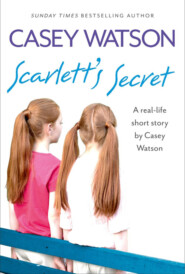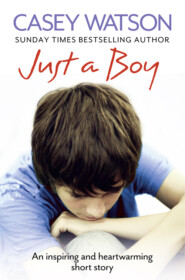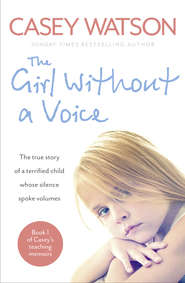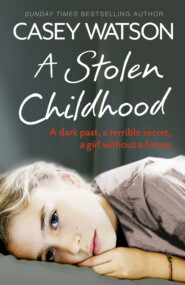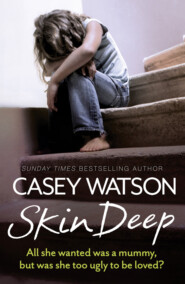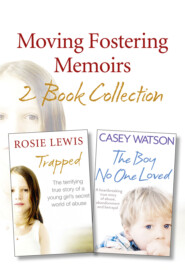По всем вопросам обращайтесь на: info@litportal.ru
(©) 2003-2025.
✖
Groomed: Danger lies closer than you think
Настройки чтения
Размер шрифта
Высота строк
Поля
‘I wouldn’t count on it,’ Keeley said.
I was confused. ‘Count on what?’
‘On me being able to see her. I’ve got four actual brothers and sisters. Did they tell you that? I bet they didn’t. I’ve never seen any of them since the day I went into care. Not even once. Social services are all bastards.’
Four. Never seen again. My heart wept for her. But now I had to speak. Start as you mean to go on and all that. Especially with a kid that’s been in the system a long time. ‘Sweetheart, I know you’re angry, and you’ve every reason to be,’ I said gently. ‘And we will sit down and talk about all this, I promise. But we don’t allow that kind of language here, okay? Me and Mike have young grandkids, so it’s just one of our rules. One of our few rules. So can you try to think of other words you can use?’
She had the grace to look embarrassed, which surprised me. From her initial demeanour, I’d been expecting more attitude. I wouldn’t have been surprised if she’d answered with ‘whatever’. Or told me to sod off and leave her alone. So though it was only a small thing it was an important one; it built a bridge between us. ‘Sorry,’ she said, looking downcast. ‘I’ll try not to.’
‘Thank you,’ I said. ‘I know you will.’
The consensus wasn’t quite so positive when I returned to the living room. ‘Yes,’ the female officer was saying, presumably in answer to something Mike had asked her, ‘we do think the accusation against Mr Burke is probably false. It just came out of nowhere, for one thing, and was quite a time coming. We were asking her why she didn’t want to go back there, obviously, and she was coming up with all kinds of reasons for running away. They were too strict, too fussy, too stupid and so on. The usual teenage things you’d expect. And, of course, at that point there was no question that we wouldn’t be taking her home again. Of course we would be. But when we explained that – that we had no choice but to do that – out the accusation suddenly came. With a smirk, even, like she knew exactly what she was doing. ‘‘Steve’s been touching me up,” she goes. “There! You can’t take me back now, can you?’’’ The policewoman flipped the cover of her pad back. ‘And she’s right, of course. We have to act on the allegation. But we aren’t convinced there’s any truth in it. Not as yet.’
Even though I’d had my own suspicions about the veracity of Keeley’s allegation, I was still a bit stunned. Would a fifteen-year-old really be so bad that she would make up something so horrible, and even smirk about it? I knew the answer, of course, because I wasn’t born yesterday. And as foster carers, Mike and I heard about things like this all the time. Well, if not all the time, at least often enough to scare us, because it was a situation we could potentially find ourselves in. It didn’t bear thinking about.
I shook my head, said my farewells and, while Mike showed them out, went into the kitchen to pour a glass of milk and find some Jaffa Cakes.
Then I went back upstairs with them (Mike was still on the doorstep, talking about the engines in squad cars – at this time?) and pushed the slightly ajar bedroom door open with my foot.
‘Here you go, love,’ I said as I entered.
Keeley, already in bed, yanked the duvet up to her chest. ‘Don’t we have rules about knocking?’ she asked. She also blushed, instantly and furiously.
I could have kicked myself. And now I felt my cheeks flush as well. ‘I’m sorry, love,’ I said, placing the drinks and snack down on the bedside table. ‘Of course we do. I should have knocked. I’m just tired as well, I suppose. And I didn’t think you’d be so quick getting yourself into bed.’ I smiled apologetically. ‘Next time, I will knock. I promise.’
‘It’s okay,’ Keeley said. She raised a hand holding a smartphone. ‘I just wondered. Could I have your wifi password, please? I just want to drop a message to my foster sister. You know, to let her know I’m okay and that. I won’t phone her,’ she added meekly. ‘I know it’s late.’
I could hardly say no. It was a reasonable enough request. The girl was fifteen and how many of those didn’t have a smartphone? And it made perfect sense that she’d want to tell the one person she obviously felt close to that she was okay. I recited the password – long since memorised from having to constantly give it to the grandkids and other guests – and once she’d typed it in and got connected I went back downstairs.
‘She’s online,’ I told Mike once we were back on the sofa. It was very late but, despite what I’d told Keeley, I now felt wide awake.
‘So all’s well with the world,’ he said, rolling his eyes. ‘Spot of James McAvoy, then?’
I was just opening my mouth to share my joy at that prospect, when my own smartphone buzzed, with no caller ID, which I knew meant the lady from EDT again.
Mike put down the remote he had only just picked up. Yes, it was late, but if there was trouble ahead, we might as well know where it was coming from.
Chapter 3 (#u589aecc6-9912-5100-bdc3-9a62eeb44f69)
It turned out to be a very long night. Not because Keeley herself gave us any problems, and not because I watched The Jonathan Ross Show seven times. Simply because I was on the phone to Helena Curry for the best part of an hour, and then had to relate everything she’d told me to Mike. No, we might not have had a meeting, but it felt almost as good as, because she was having a quiet night, had most of the file and was happy to chat.
Our conversation wasn’t an edifying one. As Keeley had already told us, she was indeed one of five siblings. The oldest of them, in fact, by some distance. She’d been ten when they’d been taken from their heroin addict mother, the other four ranging in age from six down to just four months old. It seemed that Keeley had been their primary carer.
Their only carer, at the end. The poor, poor child.
There had apparently never been any father on the horizon, Helena also confirmed – though that didn’t particularly surprise me. The mother hadn’t even come up with any father’s name (refused to, apparently) so it wasn’t even clear if the siblings shared full DNA.
Keeley’s mother’s world was one with which I was rather too familiar. It was one in which having babies wasn’t something planned – just an inconvenient by-product of being off your face on drugs every day. And it often wasn’t just drug-fuelled abandon, either. It was something women often had to do to keep their drug-dealers – their drug lifeline – sweet. And, as with any world run by ruthless dictators, which the drug world definitely was, there were no safety nets for those at the bottom of the heap, much less family planning guidance or contraception.
Keeley’s family had had a long history with social services. They had been known to them for several years before the children were actually taken, as is often the case. I could all too easily envisage the endless cycle of visits and recommendations, of promises made and broken, of ‘at risk’ children see-sawing between their mother’s desperate attempts to get clean, and then failing, and the inevitable neglect. The measures social services would implement would become ever more intense, then, till the point where it would be unconscionable, if not indefensible, to let the children remain in the family home.
I wondered where and how the mother was now. Whether she was still alive even. Chances were she might not be. There was nothing on the file to say either way, apparently. In any event it was an everyday tragedy. Her life had already been that, whatever had happened to her subsequently. Five children existed, without her, to prove it.
And however much I could sympathise with the mother (heroin is a horrible addiction) my greatest sadness was for her children. And, more than that, for the fact that they’d been separated. Helena wasn’t sure about the whys and wherefores of that, because it had all obviously been a long time ago. All she knew was that the children had all been taken one night, following a tip-off from a neighbour about hearing screams and shouts, and that when the police and social services had attended the incident a man known to the police – a local drug dealer, Helena read out – had been arrested and charged with several offences.
The children had been scattered pretty quickly. Keeley went to one foster family, the two next oldest to another, while the little ones, as was usual in cases like these, went to a further home and were both immediately put up for adoption. ‘It looks like the middle two are still with the same foster family,’ Helena told me. ‘And it says here that the youngest went to adoptive homes pretty quickly. Or even home singular. They might have gone together, mightn’t they? Either way, I doubt there’ll be any more to know about them now.’
But what of Keeley? Why no happy ever after for her? And how must have it felt to be wrenched away from them all? I couldn’t quite get my head around how devastating that must have been for her, particularly if, as Helena said, she’d been so responsible for their welfare. How on earth must she have processed such a horrendous trauma? One minute being a second mummy to four cherished younger siblings, the next being cast adrift and denied any contact. How could she possibly come to terms with being allowed no contact with the brothers and sisters she had looked after since they had been born?
‘I honestly can’t understand it,’ I said to Mike as we chatted on into the not-so-small hours. ‘Surely it would have been better to allow them to see each other. Better for all of them, too – not just Keeley. That must have been terrible for them. It’s borderline barbaric. Maybe not so much the baby, bless him, but for the others … I just can’t believe they’d do that. It honestly beggars belief.’
I had, of course, raised the question with Helena. I’d had personal experience of children being denied access to one another, after all. In that case because the older child, who’d been horribly abused sexually, had started behaving inappropriately towards their sibling because they didn’t know any different.
But this didn’t appear to be the case with Keeley, who’d apparently done her best – at least as far as what Helena knew of the record went. But decisions sometimes get made based on instinct and experience as much as anything. But whatever the full picture, Keeley’s care for her little brothers and sisters had been repaid by being taken away from them. That’s how it must have seemed to her. No wonder she hated social services.
‘They must have had their reasons,’ Mike said. ‘And don’t forget, that’s often how it goes with long-term fostering and adoption. Maybe for the new families – the ones who ended up with the others, that is – it was part of the deal. A complete new start, with no reminders of or links to the past. Maybe that was it? To give the best chance for four, at the expense of one? These must be hard choices to have to make.’
‘But should they even be allowed to stipulate that? I mean, why would knowledge of an older sister hurt a child? Surely it would be a comfort to them to know they had blood family to call their own?’
‘Or maybe, given how little they were, it was decided it would be less complicated for them psychologically, easier for the parents, not having the spectre of a complicated older sister, social services involved in their lives, and –’
‘But what about Keeley? What about her happiness? It just seems so wrong.’
Mike touched my arm. I was raising my voice now. ‘How do we know they didn’t think it best for Keeley too? I know it seems insane to you now, but maybe at the time they felt she’d become too much the carer –’
‘But to deny all contact – why?’
Mike shrugged. ‘Love, I honestly don’t know. But what I do know is that we don’t live in a perfect world. You of all people should know that.’
I did know that, and maybe he was right, but still my heart ached for the poor kid. She’d been removed from everything she knew, and the siblings she loved, and was now just another kid in care, forgotten by wider society, and, after five long years, was deeply embedded in the system. How heavy must be the emotional weight she carried. And none of it her fault.
Most depressing, however, was the knowledge that her placement with the Burkes must have felt like the best outcome imaginable. She’d been placed with emergency carers first, where she’d spent a wretched few weeks, by all accounts. Thrown into emotional chaos, she’d apparently been described as a ‘nightmare’. Then moved on, to an interim placement, with specialists like we were, before the Burkes, who fostered for the same county council, said they’d be happy to take her in long term.
‘To complete the adoption illusion for them too,’ I said to Mike, my voice bitter on the poor girl’s behalf. ‘Helena read me a little bit of a looked-after child review she had. You know, Keeley actually said that she felt she had been brought in as a playmate for Jade – can you imagine that? How it must have felt? To fill the gap as the couple couldn’t have children of their own. Like a toy ordered off the flipping internet for their existing child to play with, almost. Well, that’s obviously how it felt to Keeley. She said she never felt part of the family, not really. Oh God, Mike, what must her mind be like?’
‘I don’t know, Casey,’ Mike said, ‘but I have a feeling we’ll probably find out pretty soon, don’t you?’
And that had been his last word on the subject. And, after finally dropping off at around four in the morning, he was already gone from the bed when I woke up. Which didn’t surprise me that much – Mike was an early riser both of necessity and by choice. He managed a big warehouse, and it was physically demanding work. He’d have to catch up with a power nap on the sofa later.
As would I, I thought, yawning as I pulled on my dressing gown. Well, if I was allowed the opportunity.
I crept out of the room and tiptoed downstairs, so as not to disturb either Tyler or Keeley, and eventually found Mike out having a coffee in the back garden. I pulled my dressing gown closer, feeling the nip in the morning air, glancing up at the sky and squinting at the brightness.
‘I see you’ve found the only sunny patch left to sit in,’ I said, pulling out one of the cold, plastic chairs, and checking it for cobwebs. For all its beauty, autumn was a horribly spidery time of year. ‘Looks like it’ll be a nice day, doesn’t it?’
‘Seems that way,’ Mike said, looking up at the sun as well. ‘But let’s cross our fingers that we don’t have a storm to contend with in the house instead.’
I sipped my coffee, enjoying the warmth on my face, as we sat and chatted through our thoughts following the previous night’s revelations, and, in my case, observing that a fine sunny morning always made everything seem so much easier and nicer. Because, despite my sulks, I did enjoy the garden at this time of year. Not least because we still had lots of flowers in bloom, but the wasps had mostly buggered off to wherever it was they went in the winter, so I could enjoy it without being dive-bombed.






